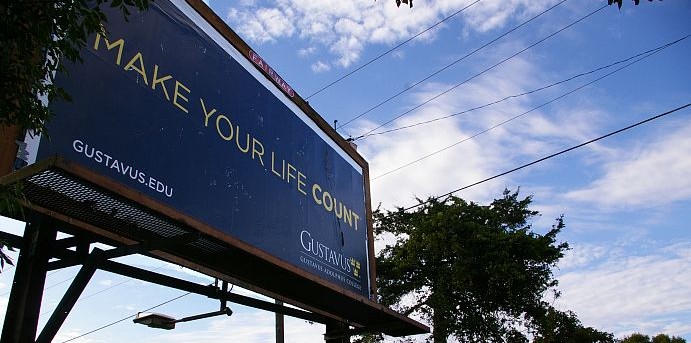Make Your Life Count. Gustavus’ catchphrase for its advertising campaign is still buzzing in our ears. It has changed people’s perception of the school (for good and bad in different circumstances, but this is not the point), and of us as students. The motto is our logo, our label. For those of you who don’t know, when the campaign first started, many students took issue with the phrasing of “Make Your Life Count.”
I want to make the point that this is not what I am addressing. Furthermore, although I agree that the slogan can come off as a bit arrogant, the fact is that we all came to Gustavus to make our lives count. Yes, the small class sizes, the liberal arts education and a relatively magnificent cafeteria had a lot to do with the decision.
However, I could have still found many of these same characteristics somewhere else. No, what made Gustavus different was that the professors cared, the students cared and, in general, the campus sought to be the change it wants to see in the world. I do want to make my life count, I do want to make a difference and I do want to live a life where income is not my sole purpose for my future endeavors.
So now the question is: “Was the Make Your Life Count campaign effective?” Well, that depends on what you believed the purpose of the campaign was. And for that to be solved, you must ask how the value of a school is judged. Is it the employment rates of graduates, the scholarly efforts of the professors or is it something less tangible? Or, could it have to do with the number of students and/or number of applicants? Here lies the problem.
Let us first analyze what has happened since the campaign began. Gustavus received many quality applicants, many of whom heard of Gustavus through the campaign’s efforts. Gustavus received its biggest first-year class of all time this year. What this has meant for me, however, is an increased number of students living off campus, including many upper classmen, which hinders the development of community that we are trying to foster here.
Along with this comes an increased students-to-professors ratio, and somehow my tuition seems to still be going up. The primary reasoning in my decision to come to Gustavus was the togetherness that the campus exemplified. While I am not concerned that this one class will make it difficult for professors to memorize everyone’s names, or that we have too many students living off campus, I am concerned that if this leads to a trend, the very landscape of Gustavus could look entirely different.
Gustavus needs money to function. No one is denying that. However, given that we have had the biggest first-year class ever, if these class sizes continue, Gustavus is going to be more and more like the U of M. Let me reiterate that there is nothing wrong with U of M whatsoever, but we came to Gustavus specifically for a purpose and the Make Your Life Count campaign does not seem to be perfectly aligned with that purpose.
Perhaps this process adds somehow to the institutions of faith, service, justice and excellence (and possibly even community). Maybe the higher amount of applicants will lead to more excellence in our student body. What if the added number of students can add to the amount of service that Gustavus does? More students could mean more religious diversity on campus. (Although when we argue about an inter-faith space on campus, this does not seem to be true.) The fact is that even if all of these factors were true, then this logic would dictate that we increase acceptance every year to pursue the same goals that we are supposed to be pursuing now.
So was the Make Your Life Count campaign effective? Here’s the thing: even if the campaign was effective by adding more students to the school (In the words of Mr. Feeney, “What good is it if we can’t get the butts in the seats?”), it has hindered the development of community that is an integral part of the Gustavus experience. I don’t totally disagree with the rationale for the campaign. The economy was in a downturn, and I can understand why that would lead to Gustavus not having as many applicants. But given the size of this year’s class, we should all be aware of the effect this campaign might be having on our highly valued campus community.
